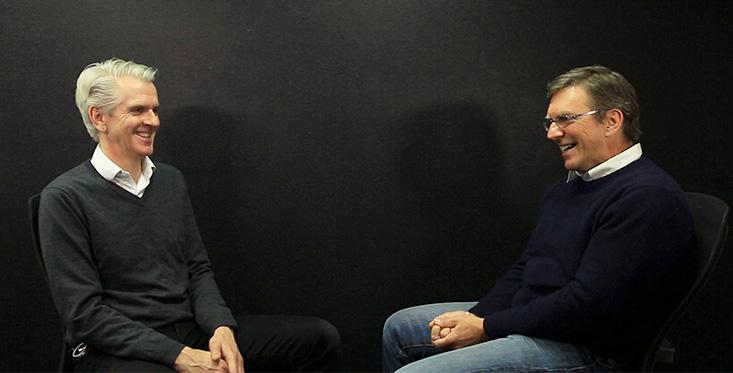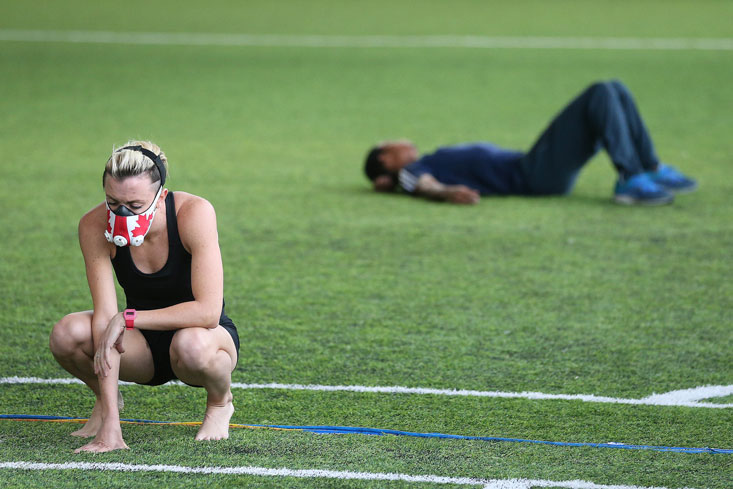You could say the job of the sports fan is not only to cheer but to jeer. Take the Rio Olympics. American sprinter Justin Gatlin, who has been suspended in the past for doping, entered Olympic Stadium before his 100-meter race to resounding boos. Competitors are also a part of the ritual. After winning a gold medal, American swimmer Lilly King wagged her finger to mock her Russian competitor Yulia Efimova, who previously had been suspended for doping.
To philosopher Julian Savulescu, the boos and censures ring with, if not outright hypocrisy, short memory spans. “Caffeine is a performance-enhancer,” he says. “It used to be banned and now it’s allowed.” Savulescu, a native Australian, who directs the Uehiro Center for Practical Ethics at the University of Oxford, has been one of the loudest critics in recent years of doping policies. Sports governing bodies have had restrictions in place for decades, he says, and have had little effect. Athletes will always find a way to beat the system, he says, and like most sports fans, Savulescu laments that doping creates an uneven playing field.

But unlike most fans, Savulescu thinks the solution is to make doping legal in sports. For over a decade he has worked on the intersection between biotechnology and ethics, building the case for his view that we are masters of our nature and ought to use biotechnology to shape it to our and society’s benefit. Savulescu, not surprisingly, has his own boo-birds, bioethicists who say he treads morally shaky ground. Robert Sparrow, a philosophy professor at Monash University in Melbourne, Australia, is an applied ethicist who has brought a critical eye to the role of technology in our lives, and not been shy in the past about stating where he thinks Savulescu goes astray.
On a recent evening, Nautilus brought the two philosophers together to debate doping in sports and defend their moral views. In a classroom at Monash University, the two thinkers got riled up over a range of subjects. They included a hypothetical Olympics games with no restrictions at all on performance enhancements, whether women athletes with high levels of testosterone should be allowed to compete in the Olympics, and if swimmers born with webbed fingers present an unfair advantage.
Should the Russian track team have been banned from the Rio Olympics for doping?
Julian Savulescu: They should be banned because they broke the rules. If people break the rules, they should be banned. But given how widespread doping is, it’s important to ask whether the criteria the World Anti-Doping Agency is trying to impose is realistic and ethical. It’s not realistic. We’re seeing the failing of anti-doping policy year in, year out. It’s also not ethical. We should drop this criterion of banning something because it’s performance-enhancing. It’s complete nonsense. Sport is about performance-enhancement. It’s about giving yourself extra glucose, extra water. Caffeine is a performance-enhancer. It used to be banned and now it’s allowed. Beet-root extract, Creatine, going into a hypoxic air chamber—all these are performance-enhancers. Going into high altitude raises your red blood cell count in the same way that EPO or blood doping does. The idea that something is performance-enhancing itself is just not an appropriate reason to ban it.
Robert Sparrow: Except when it goes against the spirit of the sport to use a particular technology. You could fire sprint racers out of cannons and they would go really fast. It would be performance-enhancing. But it wouldn’t lead to anything that was entertaining and it wouldn’t reward the excellence that we think of as being valuable in sport.
You could fire sprint racers out of cannons and they would go really fast. That’s performance enhancement.
Savulescu: WADA has a single criterion. They say that performance-enhancement is itself against the spirit of sport. What they mean is not performance enhancement per se because training is performance enhancement. They ban what they call artificial performance-enhancers. Clearly, caffeine is artificial in the sense it doesn’t occur in the body, but it occurs in a coffee bean, so it’s natural. Whereas injections of growth hormone are unnatural because injections are not natural.
Sparrow: That seems perfectly reasonable to me. I don’t think we should toss the distinction between the natural and the artificial out completely. What people are looking for in athletic sports is the limits of the human body. People do have a reasonably clear, intuitive sense that certain drugs are not responsive to the kinds of virtues that they’re looking for in their efforts. You’re right, if people can use oxygen chambers and they can’t use blood doping, there is a certain amount of moral arbitrariness there. It’s also understandable that people want to know what they’re seeing. They want to believe that it’s the grit and determination of the athletes that is doing the work. And if they have superior performance, it’s not because they’ve got a better team of chemists behind them.
Savulescu: I don’t have a problem with having a test of natural ability, it’s just that it’s not enforceable. There’s no particular reason to stick to that. My point is the rules are arbitrary. We could change them if we wanted to. And we could change them to be better and more fairly enforced. The current system disadvantages the honest athlete. The guy that sticks to the rules is at a disadvantage from the cheater who gets away with it.
Sparrow: There’ll always be cheaters. The concept of cheating is relative to the rule. No matter what rules we have, there’ll always be people who cheat. Rules are a cultural construct. Enhancement is relative to a set of rules: Sometimes using shoes in sport will count. Sometimes they won’t. Seems to me you want to avoid people being brain damaged.
Savulescu: I completely agree. There can be different reasons to support different sets of rules. This is another phenomenon of ordinary moral thinking, that it’s either black or white. Either one set of rules is right or the other set is right. In the case of oxygen-assisted climbing, you’re promoting speed and protection of the body, versus just testing what the body can do without any assistance. There isn’t a clear right and wrong answer. What you need to do is pick the set of rules that maximizes the promotion of the values that you most want. In the case of doping it’s unfair, because it’s disadvantaging the honest athletes and it could be better-advantaging them. It’s not promoting safety because people are trying to sidestep the rules and using unsafe doping practices. It’s ruining the spectacle of sport. As soon as a race is over, someone is disqualified. You’re never sure whether the kind of result that you’re seeing now is going to be the result that you see tomorrow, because somebody’s going to be pulled from the race.
Sparrow: I can’t say that any rule change is going to prevent that.
Savulescu: No, but you can reduce it. You could eliminate all of these cases of EPO and blood doping by setting a fixed hematocrit [the percentage of red blood cells to total volume of blood] as your limit. If you’re over 50, you’re out; if you’re under 50, you’re in. Instead of trying to work out whether somebody went from 45 to 47 naturally, or they were taking micro doses of EPO, you’d be able to get rid of all that.
No matter what rules we have, there will always be people who cheat.
Sparrow: Then everyone would sit at 50 and the pursuit of excellence would move to a higher limit. The interesting question is whether that would lead to more or less harm to athletes. I think it’s plausible it would lead to more harm because athletes would be subjecting their bodies to all the stresses they are currently doing with the illegal doping, plus they would be moving to a whole new ring of doping, trying to break whatever new rules we’ve come up with.
Savulescu: One reason for picking a set of rules is to minimize the amount of cheating. My claim, and it’s been borne out year-on-year since I first wrote on this in 2004, is that this isn’t minimizing cheating. It just gets worse. The fact that we’ve found a state-sponsored Russian program of doping is just an illustration of the failure of the system.
Sparrow: But we don’t want to try to minimize cheating by just taking all the limits off because that will generate more unsafe behavior. Given the money involved, that would be incredibly bad for the athletes. We have to understand that people who’ve dedicated their lives to these achievements are quite vulnerable. Having a set of rules that makes it more plausible for them to damage themselves is bad public policy.
Savulescu: You have to set a level of safety. People are rendered quadriplegic from playing American football. They’re rendered quadriplegic from horse riding, from playing Australian football. Sport is dangerous. Against that backdrop, taking doses of growth hormones, steroids, or blood that are within physiological limits is nothing in terms of risk.
Sparrow: I’m not convinced that by allowing more performance-enhancing drugs will lead to lower levels of harm. I don’t think we’ll see any less risk, and we’ll see more dangerous drugs. Also, there’s something ethical about obeying the rules. If the rules say, “Don’t take these drugs,” and people are taking them, that’s unethical, and they should be prohibited. I agree that this is not about purity but more about sensible social policy in relation to athletes. But moving the limits is not going to stop people from pushing up against them.

What if we got rid of the limits and had an all-out Olympics?
Sparrow: Julian has proposed it. It makes no sense. It’s incoherent. It seems silly because why not put the long-distance runners on motorbikes? Why not have the people doing high-jump pulled up on strings? The sports would make no sense at all. If you’re going to argue for an all out Olympics, it’s still got to be within a certain set of restraints.
Savulescu: You could allow a completely libertarian, laissez-faire form of sport where there are no rules. Take ultimate fighting. This is an example where you’ve got rid of the rules that protect people from injury.
Sparrow: But they can’t bring knives.
Savulescu: No, that’s right. You can set some rules. Obviously, to run the 100 meters, you can’t come with a motorbike. You could say, “You’re allowed to take any substance that enables your natural legs to run faster.” If you want to take amphetamines, cocaine, alcohol, or steroids, you can take anything you want.
Sparrow: Let’s be honest here. This is not a sport without rules. The moment you say you can’t be on a motorbike, you’ve got rules.
Savulescu: Of course. You can’t have a sport without rules because it’s got to define the behavior that is meant to be the test of their physical excellence or skill. Sport requires rules. The question is what sort of rules. Could you allow any sort of performance-enhancing substance, no matter how dangerous? You could. You could have an Olympics that test the effectiveness of bionic limbs, so that healthy athletes amputated their legs and ran as fast as they could on bionic ones. What do I think about that? If people want to have their limbs amputated to compete in a sporting event, and they’re fully competent, and they don’t have a psychiatric illness—in my view, that’s a choice. In fact, I had to write for a disability journal about precisely this case. A woman, who was a paraplegic in the disabled Olympics, wanted both of her legs amputated so she’d be lighter, to perform better. The question was, “Was this performance-enhancing?”
Sparrow: Without speaking to that particular case, a circumstance where able-bodied athletes are cutting their limbs off for the sake of sporting excellence doesn’t look like an example where people aren’t being encouraged to harm themselves.
They’re not turning into the Hulk, they’re extending themselves to the limit of human physiology.
Savulescu: It depends on the effectiveness of the bionic limb. If it’s like the $6 Million Man’s, and it’s better than what you’ve got, it may be it’s rational to do that. But we’ve drifted into science fiction. This is not what we’re talking about in Rio. We’re talking about whether athletes should be allowed to take small amounts of growth hormone, steroids, and blood. My answer to that is yes, if it’s within physiological limits that are not going to radically change what we’re watching.
Sparrow: Again, though, we expect everyone to have an equal chance in a sport. Expecting sport not to involve some things that are morally arbitrary just seems foolish to me.
What do the limits mean? What if we’re able to create webbed fingers for swimmers?
Savulescu: Having webbed fingers would be against the spirit of swimming because it would give you a significant mechanical advantage, much the same as a blade or a bionic limb would. It would significantly change the character of that activity. In fact, all of our hands are webbed early on in development. You can imagine a case where this webbing doesn’t disappear and somebody is born a freak. In one sense, that’s what the Olympics is. It’s a test of the genetic freaks. But an individual that has naturally webbed hands should not be allowed to compete in the Olympics because they’re doing a different kind of activity. The standard view will be if that’s a natural aberration, a genetic difference that occurs in nature, they ought to be allowed to compete, even if they win every single event by seconds.
Sparrow: At one level, this just seems morally arbitrary. If the rules are whatever you are born with, you can bring that into the sport. Some people are born better swimmers, and we don’t freak out about that.
Savulescu: It depends on how you define the activity. There is no deep truth about whether this individual should or shouldn’t be allowed to compete. It just depends on which set of rules we pick. My point is only maybe it’s time to think whether we should change the rules.
What about the South African runner Caster Semenya? Should she have been allowed to compete with women given her intersex condition produces higher levels of testosterone?
Savulescu: The situation is similar to the male cross-country skier, Eero Mantyranta, who had a natural mutation for the EPO receptor gene, which resulted in up to 50 percent more oxygen carrying capacity. He was not stripped of his three Olympic gold medals. This is another example of “natural doping.” There have probably been a lot of female medal and record holders who were intersex. It is wrong to make up the rules as you go along. The rules have been essentially that if you have a natural advantage, then you should be able to compete. If you create your advantage artificially, especially using performance enhancing substances, you can’t compete. We should allow people to compete in the normal human physiological range. We could allow those with natural performance enhancing advantages to compete for inclusiveness, but this would be more unfair to the rest of the field. It is ultimately up to us to decide on the rules for the future: Do you want a test of what nature can create, or do you want a more normal, fairer, safer playing field? You can’t have your cake and eat it too. I think it would be unfair to exclude Caster at this stage as she has invested her life in it. It would be discriminatory.
Sparrow: If sports are going to continue to be segregated by sex, such that male and female participants compete in different events, then, inevitably, there will be pressure on sports administrators to police who can and can’t participate in competition. What makes this especially problematic is that we now know that sex is more complicated than a binary division into two clearly defined and discrete categories. Given the public profile of athletes, official inquiries into their sex are likely to generate a predictable set of harms, including invasions of privacy as we saw in the case of Semenya. Unless we move to testing all athletes for their natural levels of testosterone and insist that there is a maximally permissible level in the sport, I can’t see a justification for targeting women with supposedly high levels of testosterone for special scrutiny.
Let’s go to the other extreme. What do you think about having sports without any kind of enhancement at all?
Savulescu: I don’t have any problem with trying to just see what the noble savage can do unassisted. But we reached the limits of that at the Seoul Olympics in 1988, when Ben Johnson ran under 9.8 seconds. He was found to be doping. Subsequently, at least six out of eight people in that final were at some point accused of doping. If you run under 9.8 seconds, you’ve pretty much surpassed what the normal human body can do.
Sparrow: Then again, I don’t think that changing the rules, if we have any rules at all, there’s any reason to think that those figures will come down. People will just look for the next edge. They’ll all take the drugs they’re taking now. Then they’ll look for something else.
If athletes had gills, you might worry about the gap that’s emerged between them and us.
Savulescu: The point that I’m making is that if you had periodic testing, and you’re in the physiological limits for growth hormone and testosterone and various blood parameters, you would know whether that individual is within a limit of the doping. They’re not turning into Gigantor or the Hulk, they’re extending themselves to the limit of human physiology, which is what we expect people to do. It’s fantastic seeing Usain Bolt set new world records. But if you want world records now, I’m sad to say, it’s not going to be the noble savage that’s going to run them. We’re long past the Chariots-of-Fire idea of Roger Bannister doing a bit of training after his work as a doctor, and then breaking the 4-minute mile. That was his enormous achievement. He did it himself, without a whole team of doctors, nutritionists, sports medicine physicians, masseurs. It’s a whole industry around individuals. People want to believe in heroes who are clean individuals, who do it just through sheer grit and great genetic talent. But that’s a fantasy.
Sparrow: One thing that we can agree on is the more money you put behind sport, the less pure it looks. The less it looks as though it’s rewarding individual talent. The more it’s rewarding massive sports institutes, doping programs. If people are looking for a less artificial, and a less unjust athletic event, then maybe we do need to look at the incentive structure. It seems pretty clear to me that if you allow people to take all these drugs, they will take them. What we will see, then, is much more obviously the result of who’s got the best physiologists, and the best biochemists behind them.
If new rules make enhancement less taboo, allowing us to become masters of ourselves, what effect might that have on society?
Sparrow: The question of whether we would end up with too much mastery, and of human genetic modification, is a big debate. It’s worth keeping in mind that the larger the gap gets between professional athletes and ordinary people, the more miserable ordinary people will feel about themselves. There is some reason to try to keep people recognizably human, so that everybody else doesn’t feel miserable that they can’t achieve the remarkable things that they can achieve. Clearly, these people are already excelling. If they were hyped up to the gills, or if they had gills, you might worry about the gap that’s emerged between them and us. The obvious thing to say about genetic modification of athletes is their parents would have to do it to them. In many circumstances, it wouldn’t actually be good for a child to have a parent who genetically modified them to have gills.
We need to tailor our rules for human beings, not for angels, or the fictions of our imagination.
Savulescu: There are two world views here. There’s the conservative world view that we accept ourselves as God, or nature, designed us. We try to display the talents and excellences that we have as individuals. Sport is about testing those. There’s the more Promethean view that we are masters of ourselves. To be human is to be better. It’s to create ourselves, and endlessly recreate ourselves to be better, to perform better, to excel in new and different ways. I happen to be in the second camp that believes that what differentiates us from excellent racehorses, or excellent greyhounds, is our ability to make decisions about what sort of person to be, what sort of competitor to be. We’re not a horse with a jockey on our back. We are our own masters, and that includes deciding what kind of physiology, what kind of mental determination we have. In my view, it’s a part of human evolution to enhance our performance in those ways.
Sparrow: It’s not a part of human evolution. Evolution has no purpose.
Savulescu: No. I call this rational evolution. It’s not Darwinian evolution.
Sparrow: I think your description of these two world views is exaggerated. Everyone has areas in which they think it’s appropriate to try to extend themselves. Everyone has areas where they say, “No, I’m going to accept the limits.” Indeed, that seems, to me, constitutive of agency, is that you have purpose within particular limits. No one really wants to completely transform the environment around them because they would lose their goals. They would lose their purpose. We can decide which goals are meaningful, what things we could accept.
We love when athletes break records but criticize them when they dope. Are we moral hypocrites?
Savulescu: Yeah, absolutely. I think it’s huge hypocrisy. People are living in fairyland. They want to see records broke, but also want their athletes to be clean. They’re shocked when athletes behave like human beings, and have affairs, or behave morally badly in their own life. They expect that these people will be some kind of construct of all the virtues that they hoped a human being could have. It’s just an unrealistic world. We need to tailor our rules for human beings, not for angels, or the fictions of our imagination, hopes, and dreams. We need to make the rules that are fit for humans.
Sparrow: It’s not wrong to expect people to play by the rules that you’re paying them to play by. Why someone who’s a good runner should be a virtuous person is another question. You can expect a good runner to pay attention to the rules around running. If those rules currently include not taking a particular drug, you can expect them not to take that drug. I’m not massively interested in the setting of records, and we shouldn’t expect records to be broken regularly. If it’s harder for people to break records, then we’ll be more impressed if they do. This idea that human performance will just keep increasing does seem to be a fantasy. If the future of sport is that fewer records are broken, I’m not sure that would be a bad thing.
What should the future of sports look like?
Sparrow: I’d like to see less money in sport. I think that we should be paying attention to what harms athletes do. We should acknowledge that the rules are arbitrary, and then have a conscious conversation about how they can be shaped.
Savulescu: What I would like to see in sport is us using the results of our science, and our understanding of the human being, and our technology, in a fusion with the individual, that protects the things that we most admire, or brings out more of the things that we most admire in athletic performance and physical excellence. Rather than rejecting it wholesale, we choose how to use it, and to evolve sport in a way that promotes health, but also promotes the excellence of that activity.
Regan Penaluna is an assistant editor at Nautilus.


























